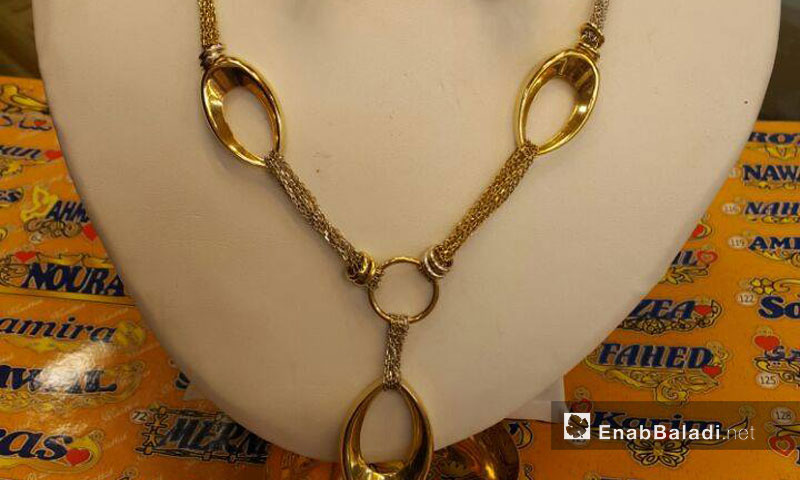
The Gold Market in Idlib… Activity Continues and Trade Still Profitable

Murad Abdul Jalil – Enab Baladi
The gold market is still active in the city of Idlib in northern Syria despite the regime’s daily bombardment of the city since Syrian opposition factions took control in April 2015.
The gold market includes around twenty stores and jewelers in addition to other places where gold is bought and sold such as the cities and towns of al-Dana, Saraqib, Binnish and Khan al-Shaykhoun. The continued activity indicates that citizens are still purchasing gold despite the rise in its price, with one gram almost reaching 19,000 Syrian pounds.
An Organization Specialized in Pricing Gold
After the Syrian regime lost control of Idlib, a group of traders and jewelers in the city decided to form a small association focused on setting prices and monitoring the import and export of gold from regime areas and from Turkey, according to one of its members, Ibrahim Mustafa Awad.
He confirmed that the association had been affiliated to the head association in the regime areas in Aleppo but had cut off cooperation with them long ago. After that, the jewelers in Idlib selected jewelers with extensive experience in the field to price the gold on a daily basis depending on the exchange rate value of the Syrian pound against the US dollar in addition to the international price of an ounce of gold.
Two Different Routes for Gold to Reach the City
Gold reaches Idlib via two routes – the first is through Turkey where “raw gold” enters legally via the Bab al-Hawa border crossing and is then smuggled to the regime areas in Aleppo and exchanged with “manufactured gold”, which makes its price in Idlib slighter lower than its price in regime areas.
The price of one gram of 21 carat gold has reached approximately 18,700 Syrian pounds while the price of one gram of 18 carat gold is 16,028 Syrian pounds. This is cheaper than in the regime areas, where the official jewelers’ association belonging to the regime announced that the price of one gram of 21 carat gold is 18,900 Syrian pounds and the price of one gram of 18 carat gold is 16,200 pounds as of 12 November 2016.
Some gold smugglers operate between Idlib and the regime areas but the route is a difficult one due to the presence of security checkpoints belonging to the regime, which are dispersed all along the route between Aleppo and Idlib.
Widespread Counterfeiting and Continued Popularity
The gold that enters the city is not all counterfeit-free – while the gold coming from the regime areas clearly carries the stamp of the regime jewelers’ association, some traders in Aleppo sell unstamped pieces for lower prices, some of which is counterfeit.
The jewelers in Idlib check if the gold pieces are counterfeit by burning them and placing them in hydrochloric acid. Some jewelers resort to burning gold pieces more than once as they are at times plated with a thick layer, which makes it difficult to discover if they are counterfeit.
Gold trading is still active in the city, contrary to what one would expect given the situation – around 500 kilograms of gold are sold per month according to Awad, a member of the jewelers’ association in Idlib. The high sales are caused by the spread of the “gold trade” where traders buy quantities of gold and keep it until the price of gold rises.
The tradition of buying gold for special occasions, especially marriage, has changed dramatically according to Siham al-Dabagh, an internally displaced woman from Hama city who is now living in Ariha in Idlib’s rural outskirts. “The customs and traditions related to gold have now changed. While gold used to be bought for occasions and as gifts, it is now limited to marriage only, and it is now given to the bride as a dowry when she is married rather than as a gift.”
Al-Dabagh confirmed that some people buy gold when money is available and hide it so they can sell it and benefit from it in the future in the event of financial hardship.
She pointed out the widespread availability of light pieces of gold in the market, which are bought for their appearance only and sometimes have no financial value at all.
Life goes on – this is the message from Syrian citizens living in the opposition areas despite the difficulties they face and the continued aerial bombardment of these areas by al-Assad and his Russian allies. The continued interest in buying gold is clear evidence that life continues – a clear challenge to the al-Assad regime and those supporting it.
if you think the article contain wrong information or you have additional details Send Correction
النسخة العربية من المقال
-
Follow us :

















 A
A
A
A
A
A



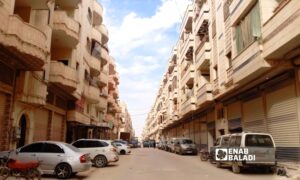
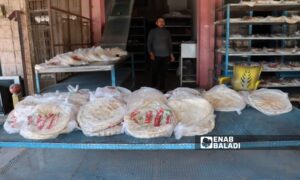
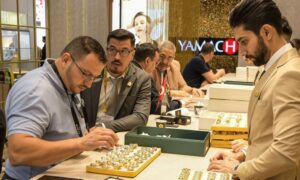
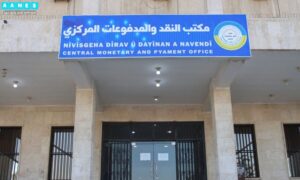

 More Economy
More Economy